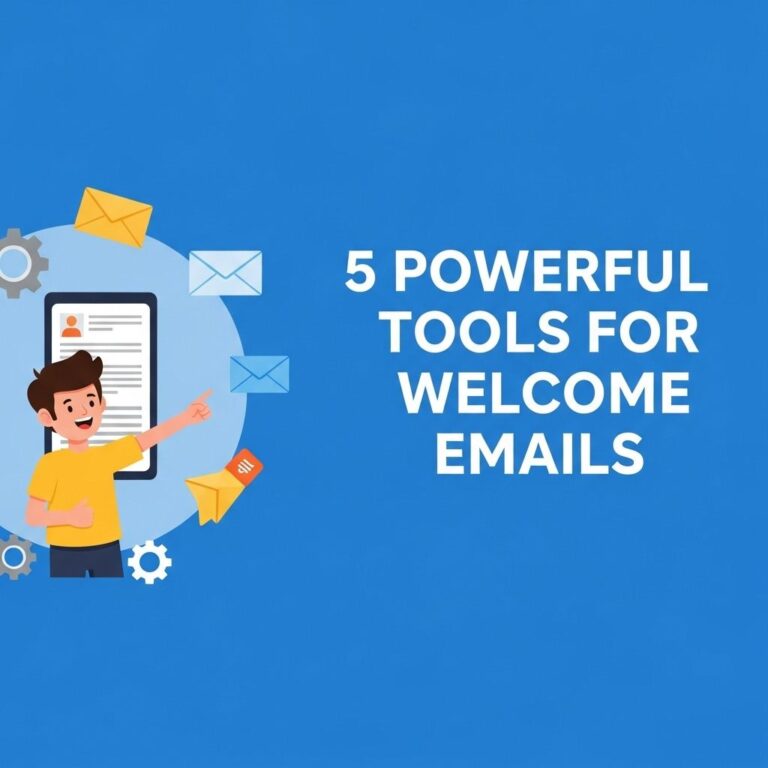Email marketing has evolved into a critical component of digital marketing strategies for businesses of all sizes. One significant aspect that enhances email marketing effectiveness is automation. With the right tools, businesses can save time, improve customer engagement, and increase their overall return on investment. In this article, we will explore five powerful tools that can help streamline your email automation efforts, ensuring your communication is timely, relevant, and personalized.
Table of Contents
Understanding Email Automation
Email automation allows businesses to send targeted messages to their audience without constant manual effort. By setting up automation workflows, companies can:
- Send welcome emails to new subscribers
- Follow up with leads after specific actions
- Send personalized recommendations based on customer behavior
- Automate newsletters and regular updates
With these functionalities, email automation not only saves time but also enhances the user experience.
1. Mailchimp
Mailchimp is one of the most popular email marketing platforms, renowned for its user-friendly interface and robust automation features.
Key Features
- Drag-and-Drop Editor: Easily create visually appealing emails.
- Segmentation: Target specific groups within your audience based on behavior, demographics, or engagement.
- Automated Workflows: Set up multi-step automation for various customer interactions.
- Analytics: Track engagement metrics to refine strategies.
Mailchimp also offers a free tier, making it accessible for startups and small businesses.
2. ActiveCampaign
ActiveCampaign combines email marketing with powerful automation features, catering to businesses looking for advanced capabilities.
Key Features
- Visual Automation Builder: Create complex automation sequences through a user-friendly interface.
- Conditional Content: Tailor content based on user behavior and preferences.
- CRM Integration: Manage relationships and track customer interactions seamlessly.
- Lead Scoring: Identify and prioritize leads based on their engagement levels.
ActiveCampaign is ideal for businesses aiming for sophisticated automation strategies without overwhelming their marketing teams.
3. HubSpot
HubSpot is a leading inbound marketing platform that provides a comprehensive suite for managing sales, marketing, and customer service, with its email automation being a standout feature.
Key Features
- Smart Email Templates: Create responsive emails that look great on any device.
- Segmentation Tools: Use advanced filtering to target specific audiences effectively.
- Behavioral Triggers: Send emails based on user actions, such as website visits or form submissions.
- Integration with HubSpot CRM: Align your marketing efforts with customer data for personalized communication.
The all-in-one platform of HubSpot makes it a great choice for companies wanting to integrate their marketing and sales processes.
4. GetResponse
GetResponse is another robust email marketing tool, known for its comprehensive automation capabilities and additional features like landing page creation.
Key Features
- A/B Testing: Optimize email performance by testing various subject lines and content.
- Automation Templates: Choose from pre-built workflows to kickstart your email campaigns.
- Webinars: Host webinars and engage with your audience through integrated solutions.
- Analytics Dashboard: Get insights into email performance and audience engagement.
GetResponse is particularly useful for businesses that want to combine email marketing with other digital strategies like webinars and landing pages.
5. ConvertKit
ConvertKit caters primarily to creators, such as bloggers, podcasters, and online course creators, focusing on simplicity and effectiveness in email automation.
Key Features
- Subscriber Management: Easily manage and segment your audience.
- Automated Sequences: Send a series of emails to nurture leads over time.
- Tagging System: Use tags to categorize subscribers and personalize communication.
- Integrations: Connect with various tools like WordPress, Shopify, and more for streamlined processes.
ConvertKit is ideal for individual creators who want to build relationships with their audience through well-timed and targeted emails.
Conclusion
Choosing the right email automation tool can significantly impact your marketing strategy’s effectiveness. With features ranging from simple automation to complex conditional workflows, these tools can elevate your email marketing game. Whether you’re a small business, a large corporation, or a solo creator, there’s an email automation solution that fits your needs.
By implementing these tools, you can enhance engagement, save time on repetitive tasks, and ultimately drive better results from your email marketing campaigns. Evaluate your business requirements, explore the free trials, and select a platform that aligns with your goals for optimal success.
FAQ
What are the best tools for email automation?
Some of the best tools for email automation include Mailchimp, HubSpot, ActiveCampaign, Sendinblue, and ConvertKit.
How does email automation benefit businesses?
Email automation helps businesses save time, improve communication, enhance customer engagement, and increase conversion rates.
Can email automation tools integrate with other software?
Yes, most email automation tools offer integrations with various software applications, such as CRM systems, e-commerce platforms, and social media.
What features should I look for in an email automation tool?
Look for features like segmentation, personalized email templates, analytics and reporting, A/B testing, and user-friendly interfaces.
Is email automation suitable for small businesses?
Absolutely! Email automation can be particularly beneficial for small businesses to streamline their marketing efforts and reach their audience effectively.
How can I measure the success of my email automation campaigns?
You can measure success through metrics like open rates, click-through rates, conversion rates, and overall ROI from your email campaigns.









